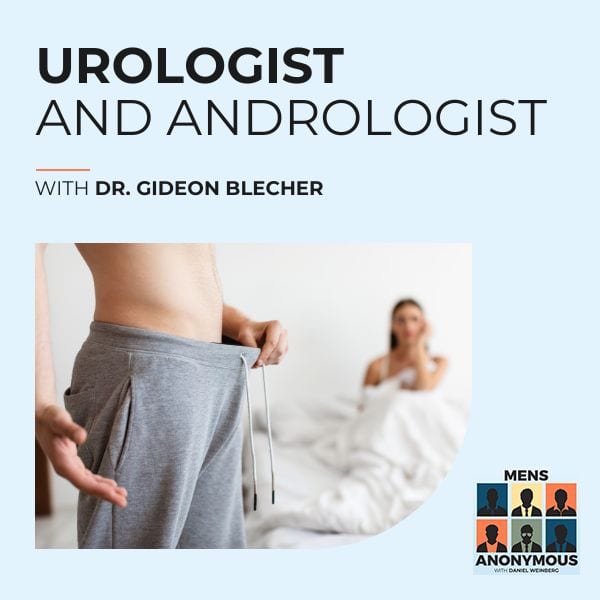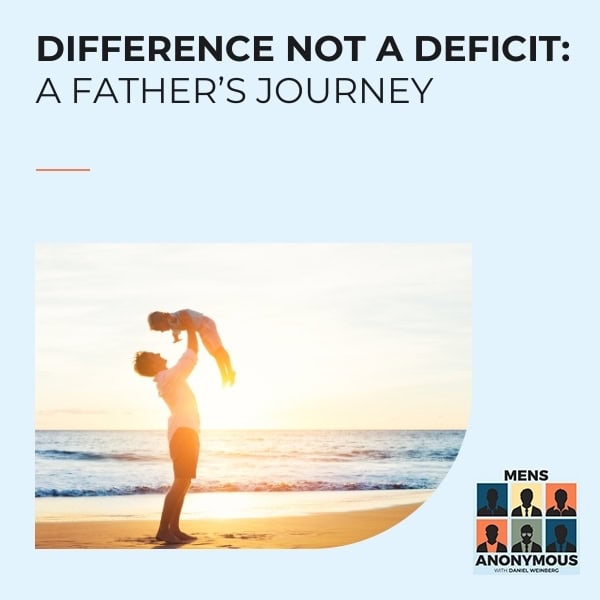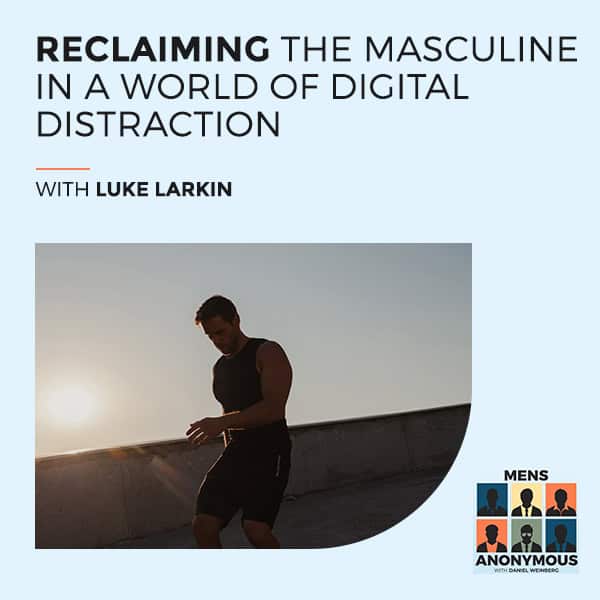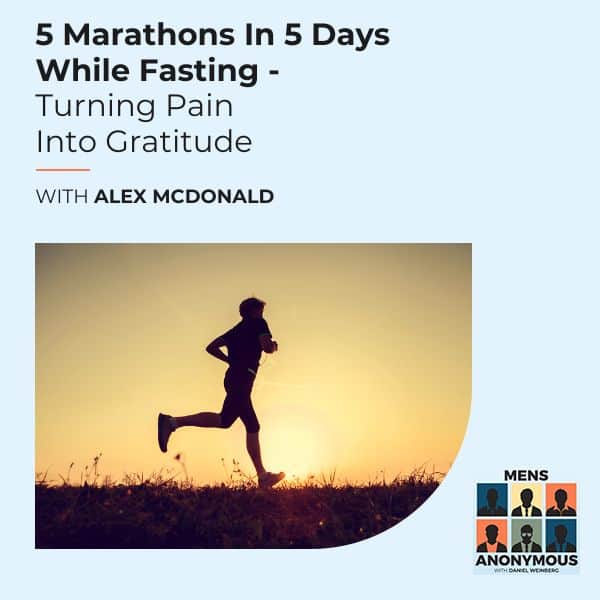
Men often turn a blind eye when it comes to their sexual and genital health, usually because of the stigma around it. Urologist and andrologist Dr. Gideon Blecher is here to take away their anxious thoughts through tried-and-tested medical treatments. He joins Daniel Weinberg to share how he helps address erectile dysfunction, fertility problems, Peyronie’s disease, prostate concerns, and other common male issues many do not want to – but should – talk about. Dr. Gideon also breaks down different methods he offers to deal with these problems, from penile implants to inflatable penises.
—
Watch the episode here
Listen to the podcast here
Dr. Gideon Blecher – Urologist And Andrologist
I’ve got Dr. Blecher, a qualified Urologist and Andrologists specializing in all things men’s health. Dr. Blecher, welcome to the show.
Daniel, thank you.
Urologist And Andrologist Dr. Gideon Blecher
Where are you in the world now?
I’m in Melbourne, Australia.
How long have you been a doctor?
I graduated in 2004.
When you get into the field that you’re in, which we’re going to talk about. You’ve been doing that for several years or you’re a general practitioner and transition into specialization?
I graduated from medical school in 2004 and then it’s years of training usually in a hospital-based system and eventually get onto programs. I’ve gone to a Urologist training program and that was about six years. Some people take some time out after that and do fellowship, which requires additional training. I did another three years of training over in the UK after. When I went over with my family and came back with a slightly bigger family and we came back to Melbourne in 2018.
When you do a fellowship in the UK, is that when you get even more specialized in a particular area or the general? When I read about your profile, why I wanted to bring you on the show was you focus on an area which is Urology and Andrology. We’ll go into what that all means but effectively, it’s covering men’s anatomy, health, genital health, and sexual health.
All of the above.
When I was looking at the area, there was a whole lot of, let’s say categories or issues that I’d never heard of. I have very open relationships with a lot of male friends all over the world. I’ve never ever heard them raise any of these subject areas as something of concern. What I think is happening is men are not aware of things that they should be aware of and know that once they’re aware of those issues, what they can do and who they can see and what’s up? My understanding of andrology when I read it was it’s the male version of a gynecologist in a way.
A urologist is a surgeon and we deal with all of the urine side of things, males and females. Anything to do with urine like kidneys, ureters, bladders, prostates, and urethras. In addition to that, we also deal with the male reproductive side of things. Urologists will do with penises and testicles and so on. Andrologist specifically at least where I did my subspecialty training in the UK refers to the urologist who sub-specializes in certain male genital related surgeries.
We cover aspects like erectile difficulties or penal issues and penal canvass and those sorts of areas. In Australia, it’s a slightly different term. An andrologist is often an endocrinologist. A doctor who deals with hormones and testosterone. As far as I go, I’m a men’s health urologist. I deal with men’s businesses that require general surgery to help.
Addressing Erectile Dysfunction And Difficulties
When we were trying to schedule the episode, I noticed that you have a very busy schedule. Your days are blocked out for the next 4 to 6 weeks. I can’t remember how far out we were looking, which tells me that there are a lot of males who have these issues. When we talk about percentages of the male population, that’s why I was very taken aback because I don’t know anyone I’ve heard of these issues.
The issues that I deal with are common but you’re probably right. Not everyone necessarily talks about it when you go out and have a drink. Erectile dysfunction, for example, is hugely common.
Explain what that means.
Erectile dysfunction is when your penis doesn’t get hard enough for long enough for satisfactory sex in a colloquial way of talking about it. It’s very common.
Something that develops later on or do you see her old an eighteen-year-old?
There are two caps of ED in terms of who presents. There’s younger guys and that’s generally going to be performance anxiety related ED, which is very common. Now, when you’re 18 years old or 19 years old and you’ve had a couple of interactions and they haven’t gone well. You’re not usually talking about it to your mates at that stage. You don’t have a good network around you, the confidence and the experience. The first instinct is to go, “There must be something wrong. My testosterone has got to be low.” It’s a very common thought but the reality is, erections require everything to be perfect.
You need testosterone. You need good blood vessels. You need good nerves. The anatomy has to be right but you also have to be good in the mind. You have to have candles and one glass of wine and not two. You don’t want to be intoxicated, tired, stressed or too nervous. It’s probably the most common thing when you’re a young guy and it’s very common. You just can’t get it up. There are treatments for it.
Erectile dysfunction is one of those issues that can turn you up. It is not just an erection problem. It affects how you feel about yourself. Share on XFor example, something a bit more related to anxiety.
It’s going to be a combination of using medical therapies like Viagra type medications, but also with psychosocial counseling. That is a psychologist who are trained to work with people in the realm of relationships, and sex. Performance, anxiety, and erectile difficulties is one of the very common topics that I’m sure that would talk to clients about. The other camp of man is those guys who develop erectile difficulties for other reasons.
For example?
Diabetes would probably be one of the more common ones. People have pelvic surgery like prostate cancer treatment surgery. People who have poor blood vessels flow into their hearts, for example. These men may develop heart attacks and needs stints in their coronary vessels or bypass surgery. The same process that narrows arteries which is atherosclerosis.
That’s building up plaque and material on the inside of these blood vessels so that the internal diameter becomes narrow. It’s not the fuel that gets to the engine. Similarly, if the engine is the heart, the engine can also be the penis. There’s not enough fuel getting down there. The same process, not enough blood. You’re not going to get great erections. That’s an arterial based or a vascular based reason.
Did you research that or is it just a Cialis Viagra solution?
The solutions to any form of ED apart from the one that we were talking about, performance anxiety. There’s a handful of different treatments available. More or less, they’re fairly general. They’re not specific for each one. It’s not like if you’ve got arterial based erectile difficulties, you take this tablet and if you’ve got nerve related ED, take that tablet. What is common to all of them though is the sense that well, if this is part of aging and sometimes our actions just get weaker as we get older. If there’s an underlying medical reason, for example, poor blood vessels.
That’s our opportunity to go, “We’re not going to treat the ED. We’re going to, we’ve got to take a step back.” We’re getting towards our 50s now. We need to look after our bodies. The question is, are you smoking? Massive risk factor for all of ED. We’ve got to take a U-turn on smoking. We’ve got to take a U-turn on, what’s your body weight like. Are you lean or overweight? Huge numbers of us are overweight. Do you have diabetes? Do you have borderline diabetes? All of these aspects need to be addressed and that’s regardless of what erectile difficulties you have because they all feed into each other.
Basically, erectile dysfunction is more symptomatic of core issues that you have.
It wouldn’t be uncommon for me to refer a guy who’s coming to talk to me about ED to a cardiologist to get evaluated and make sure that their heart is okay. It’s an interplay between them for sure.
When the male patients come forward, how comfortable are they talking to you about it? How quickly will they respond? Do they leave it for a while and say, “It’s been six months now and I’m desperate?” Tell me in the general experience.
Many men are anxious or nervous. They’ve never spoken to anyone about it. They may not have spoken to a doctor. They may have mentioned it to their family doctor, maybe. One of the privileges of my work, Daniel, is I give you a warm handshake and a smile. You come into my office and there’s a very brief moment of chitchat but very quickly, I’m going to be asking you some personal questions and that’s okay.
That’s why you’re here and why I’m here. We’ve got something to sort out and that’s okay. Very quickly, people relax into it and it’s honest based conversations as to what we’re having so that we can try and improve it. Most of the time, people walk out a lot more relaxed than when they walked in but there’s different guys.
A lot of time, older guys have been around the medical system. They know medical issues and have spoken to doctors. For them, it’s just another issue but you’re right. A large number of people are understandably nervous. Sometimes, it takes people a long time to come and see a doctor for this problem, which is a shame.
Ed is one of those issues that it can turn you up. It’s not just you’ve got an erection problem. It affects how you feel about yourself. We’re on a men’s related show and part of feeling a man is waking up in the morning or in the middle having an erection. That’s a very manly thing that we don’t even think about but when you lose that, it takes away a sense of maleness.
Maybe an indication of when is that like the years of let’s say the normal distribution of the time where you start losing that erection. When can men expect that to start happening in their lives?
On average, it’s probably around their 50s and 60s. It would be the main group. It’s going to become more common as you get older. There will be a larger percentage of men in their 70s and 80s who suffer from ED for sure. The largest of the cohort who get affected by it and want to help manage are going to start presenting in their 50s and 60s. It’s around the same time when men are presenting with heart troubles.
It’s all related. When you say erectile dysfunction, is it a dysfunction if it’s like a normal evolution of what’s going to happen to you in your life?
It’s a dysfunction as in you’re losing a function that you used to have, whether it’s entirely normal or not. Some men are very relaxed about it. It’s not a big deal. There are some men who put the proverbial boots on the hook and they’re fine with it. Sex for them is not a big deal but there’s also a lot of men out there who love sex. They always have a lot of sex and they want to continue to enjoy sex, then you bring in partners. How does the partners feel?
Sometimes partners are very sexually active and sometimes partners lose interest. Whether it’s age or age-related issues or medical issues or how they feel about sex. Every couple or every person is going to be very differently individualized. We have to acknowledge that everyone’s going to have a different path but if a man wants to have an erection, it’s our right. It’s a wonderful aspect of being a man that we enjoy and we are allowed to enjoy and even if we’re older.
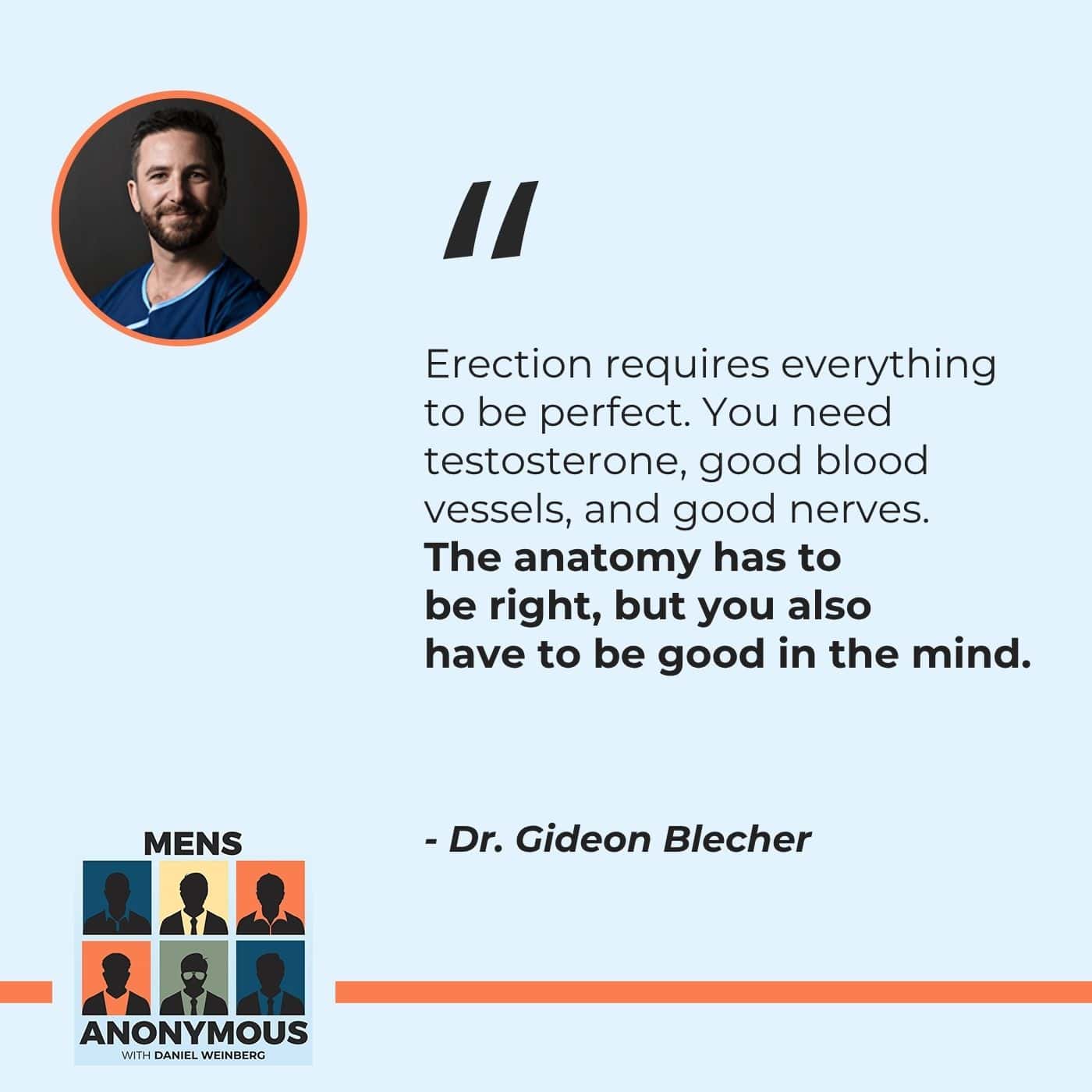
Is there any risk? I’m thinking about like, do you ever get like 85- or 90-year-old men coming in and saying, “I want you to still help me with my erection situation?”
The number of the percentage is lower in the ‘90s for sure and mid to late ‘80s much lower, but we get them. It’s one of the world’s simplest and best pleasures. You can’t be ages and say, “You’re too old.” I wouldn’t say to a guy in his twenties if he had little interest in sex, fine. You must have an interest in sex and conversely for the older man. You’re not going to say, “You’re not allowed to you.”
Dealing With Fertility Problems
I want to go through a couple of areas which I read about with fertility. I’m assuming that the way it would go here is men with a partner, want to have kids, married or not married, relevant. They’re not able to conceive. He will come and say, “Can you check whether I’m the issue?” Is that how it goes?
Along those lines. Usually, most people will go to their family doctors. You got to quit that sugar, Daniel. I’m telling you. They’ll come from a gynecologist if you’ve seen the couple because most of the time, if there’s a fertility problem, the automatic thought as well is it’s a female problem but that’s the biggest misnomer of it all.
Thirty percent of the time, it might be a female related problem, 30% of the time it might be a male partner related issue and 30% of the time, it’s going to be a combined issue, male and female. For some reason, we’ve been brought up to believe the guys can be infertile or that is super rare. It’s not super rare. Many men have a level of lower sperm count. They may expect and there’s also a smaller percentage of men who produce no sperm at all.
Is there no way to reverse that wherein someone who’s got low infertility or zero infertility?
If the man with low sperm count or quality, that might be for a variety of reasons. We have to interrogate that. The main reversible causes are probably a varicocele. A varicocele is like a varicose vein, but instead of it being down on the leg, it happens to be in the scrotum. It ends up being this extra layer of blood vessels, which surround the testicle and keep the testicle a bit warmer than it should. The breakdown metabolites within the bloodstream don’t seem to get washed away as easily. We don’t truly exactly understand how varicocele can affect sperm production but we know it does.
Do you do the same procedure, you remove the varicose veins from the scrocia?
Yes. There’s a variety of treatments, but you’re essentially trying to get rid of those varicose veins from the scrotum and that can often improve sperm quality production.
Is that the only benefit of removing them? Is there any other reason?
They can be uncomfortable, too. Occasionally, you’ll get some guys coming in and they say, “I’ve got this ache in the side of my scrotum. I noticed this.” They call it a bag of worms. “It feels like a bag of worms.” That’s the best way to describe. These ropey warm blood vessels that the veins surrounding the testicle and they can be uncomfortable for some guys. They’re not usually causing pain. They caused a heaviness and a dragging discomfort sensation. It’s usually worse with exercise, lifting, and standing. It’s worse at the end of the day. It’s just uncomfortable.
That’s how they would know. You couldn’t visually see.
You can sometimes. If they’re big enough, you’ll see them for sure. It’s like varicose veins in a leg. Sometimes if they’re big, they can pop out. You can see them through the skin. The same thing in the scrotum. That’s a varicocele. They can either present with discomfort or be related to men with some fertility. You’d see them. They’re super common. Varicocele was present in 30% or 40% of the male population. It’s not a rare problem. Out of that number, most aren’t either causing discomfort or not causing fertility issues. It’s those guys who have those two issues that I’ll end up seeing and having a discussion about how to treat it.
Prosthesis Implantation And Other Mechanisms
Otherwise, there’s no danger or risk? We talked about erectile dysfunction. When you do understand there are things you can have like inflatable penile, prosthesis implantation, penile implant, and penal injection therapy. Explain a little bit about that.
We’ll have to round back. We didn’t speak about the guys with no sperm but we’ll come back to it. For ED treatments, there’s a variety. There’s tablets. Cialis or Viagra is the most commonly known brand name of those but there’s a few available worldwide.
Do they act differently?
Slightly. They have slightly different ways of how they act but they’re all the same class of drug. They all open up blood vessels. When you open up blood vessels, it’s down in the pelvis but it also opens up blood vessels in the face. You’ll get a headache sometimes or a red face but they’re pretty reliable. They’re easy, relatively inexpensive and convenient. Half an hour or 45 minutes before and it’s available. There’s tablets.
There’s a device called Shock Wave Lithotripsy, which was started by Israelis. Very innovative in the field of sexual dysfunction the Israelis are and we don’t know 100% how it works. The thought is that it promotes new blood vessel formation in the penis. It’s been studied mainly in men who have poor blood vessel flow into their penis, but it has been looked at in other men like diabetic men, men who have prostate surgery for prostate cancer and it does help improve the erectile function to a degree. Some men might look at an alternative like a vacuum pump, which is a cylinder. It’s a plastic cylinder with a pump and that creates suctional erection.
The penis gets filled with blood and then that can often be used with a penile ring or a cock ring. A rubber band that holds the blood into the base of the penis. Most guys don’t love these. They’re a bit clunky and not very sexy. There’s not a lot of hidden type of spontaneity to it. It can also be uncomfortable to use. There’s a small number of men, maybe 10% to 15% of guys who I’ll see and discuss it with and they like it and they use it. You can use it with a Viagra or without, and that’s good for them.
The next level would be using small needle injections to basically minister of Viagra type medication, but into the penile shaft. You’re eyes just then. That’s the same as all my patients. The reality is, it’s very straightforward. It’s very easy. If you’re getting to this stage where your needing palms or rings or tablets or this or that. It’s stressful because sex is supposed to be one of those things you just roll over, you look at someone and you touch and you kiss then it happens. Not this like, “Hang on a second. I got to follow a recipe of this.” It may or may not work and all the anxiety that comes along with that.
Varicocele is present in 30% or 40% of the male population. It is not a rare problem. Out of that number, most are not either causing discomfort or fertility issues. Share on XWhen things aren’t quite working easily, we need to find something that is going to work and be more definitive. The injections can be much more reliable when the tablets and other treatments aren’t working that well. It’s like Viagra. When you want to get an erection, you’ve got to put a little needle in. It’s very straightforward. One thing at the hang of it there, a lot of guys are happy with it but not everybody. That brings you to the ultimate treatment which is a penal implant. It’s a prosthetic device and there are two main kinds.
The one that most guys will prefer and go for is an inflatable device. It has a little pump which is all under the skin. No one can see anything, but this pump sits in the scrotum. When a man wants to have an erection, he pumps that several times. There are two cylinders that sit inside the penile shaft. The penis has two cylinders in it which can fill with blood and then have less blood in them.
When you get an erection and you’re getting extra blood flow in. The veins block off and then you get a rigid penis. What we do with an implant is, we slide these balloon type cylinders into the natural erectile mechanism that I described to you then. It’s like a stand but more like a balloon because a stand will have two open ends. It’s a closed system and it’s got a little reservoir for all this fluid that sits in the pelvis.
How long can you have that inside your body?
You can have it forever. Generally, they last about ten years or so roughly because they are made of urethane or silicon. Eventually, you’ll get a tiny little tear somewhere or a hole and then all the fluid leaks out and it won’t work. It needs to be replaced, but they’re very reliable. They’re very easy to put in and most men, let alone even family doctors, GPS, have never heard of such devices.
How often are you implanting that in the man’s penis in Australia?
It depends.
How many in a year?
In my clinic, all up would probably put in about 100 or so a year. My colleague has a very high volume implanter. It’s great because all of a sudden, you literally turn someone who’s got unreliable erections into someone who’s got this reliable penis.
I’ve never heard of that. That’s wild. That’s what you call the inflatable penile prosthesis implantation.
Briefly, it’s like a big inflatable. It’s not inflatable. We call it malleable or semi-rigid and they’re just two bendable rods but the penis is always erect. It’s good for people who particularly, for example, in Australia, who live in the country who are far away. They’re very remote. They don’t mind having a penis that’s erectile all the time. They might be farmers or whatever and they don’t want to have any problems with their device because for them to come into Melbourne, one of the big cities is a big deal. It’s a very simple device which will work that’s unlikely to break or have problems with it.
Will it erect all the time?
All the time. You just have to bend it instead of it staying down in the underpants a little bit more, but it’s not as easy hidden. Most guys won’t go for that as an option for that reason.
Wouldn’t that be painful after?
No.
Genital reconstruction, what’s behind that?
There’s a few things there. For example, I do a little bit of plastic surgery in the genital region. Say for example someone has a circumcision that has scarred badly or there’s a problem with it. Sometimes, people can get problems with swelling. Everyone’s heard of Elephantiasis. When there’s a lot of swelling down in certain areas, it’s called lymphedema. That can happen in the genitals, so I can help with that. I also do gender related surgery. It’s reconstructive surgery for trans folk. That’s another area that I work in specifically and not all reconstructive urologists will do that but I do.
Understanding Peyronie’s Disease
What is Peyronie’s disease?
Peyronie’s disease is essentially curvature of the penis. Again, it’s a relatively common problem that’s not widely spoken about. It probably affects about maybe somewhere between 3% and 6% of the male population. It’s a lot. What happens is we’ve spoken early on about the erectile mechanism being these two cylinders. Peyronie’s disease is a scar which forms and we don’t know why it forms.
It may in some men be related directly to some trauma, for example, having sex. It got a little bit bent or there was a little injury at the time and then the scar forms. The problem is the scar is not elastic and the penis is an elastic organ. It wants to stretch in all directions to be what it needs to be. If it cannot stretch, it can cause problems.
Peyronie's disease affects somewhere between 3% and 6% of the male population. Share on XIt’s like tearing basically.
Not wearing. It’s just not stretching. If you imagine when a man gets an erection, the whole thing will stretch out. If at one point, it’s not going to be allowed to stretch out fully, it’ll stretch out. One side will stop and the other side will continue and you’ll get a curve. That curve can be mild. It can be 5 or 10 degrees but uncommonly, it can be severe. It can go beyond 90 degrees. My record would be about 130 U-shaped but not 180.
That causes obviously big problems in terms of sexual function. That scar doesn’t allow the penis to expand with ways either. I was mentioning earlier about veins, blocking off for good erections. You need all the blood to stay in the penis. If it just drains out, you’re going to lose it. There’s a mechanism in place that blocks off the veins but if your penis can’t stretch, it won’t block off those veins. Peyronie’s can not only cause curvature. It can also cause erectile dysfunction and a lack of length as well because your penis is trying to stretch out but it’s just not stretching out like it used to. It’s a pretty devastating disease that we deal with a lot of.
How do you know when you’ve got it?
The early stage is of Peyronie’s is characterized by pain with erections. Not everyone gets pain and then it changes. You may even notice these scars in the penis. You’ll sometimes feel a lump in there. A curve would probably be the most common presenting thing that people would notice.
When you say curve, are you’re saying where it’s erecting left or right?
Towards your face is probably the most common. Less common would be away from your face.
Does it happen through puberty?
Again, it’s usually towards 50s and more 60s age groups that it occurs. There are another group of guys who presents at late puberty but that’s not Peyronie’s disease. That’s genital penile curvature. As a guy is growing through puberty, if one part of the penis grows too much.
When you say one part, what is that mean?
If there’s a section of the pain. Say the top side of your penis just grows too much and the other side doesn’t develop as much, then that will cause a curvature. To have a straight penis, all the elements need to be the same length. If you’ve ever seen a porn movie, you’ll have to take my word for it. Apparently, my friend told me. There’s not an insignificant number of man in movies who have slightly curved penises and there’s a reason for it.
It’s because they generally got longer penises because part of it kept on growing. It was meant to stop but it didn’t. That curve can be quite significant. They’re not going to make it onto the movies, but the guys who’ve got subtle 20 to 30 degree banana type curves. You’ll see it. The next time you go on, check it out. These guys will present late in their teens like 18 years old or 19 years old or early 20s and they’ll say, “I think I’ve got Peyronie’s disease because we’ve looked it up.”
Is it because of the shape or because it hurts?
Usually, it will be because they’ve now realized that their penis is different. Some of them will have engaged in sex and if it’s comfortable or no problems, they won’t come and see me. If it’s uncomfortable or there’s problems, then they’ll come. Those guys are a different type of problem but it’s still a penal curve but it’s not Peyronie’s disease.
Men who’ve got a more curve banana shaped penis more at risk?
More at risk of what?
In that developing as they get older?
No. They develop the banana curve because one side’s growing too much. Not all of them need surgery to fix them. If they can engage in sex and they’re happy, then there’s nothing to do. Enjoy the movies and sex. If it’s more significant then yes. Sometimes we need to get involved. Occasionally, I’ve operated on guys who’ve never even tried to engage in sex because it’s a significant enough curve that I know it’s going to cause problems and they are so embarrassed by it. They’re like, “I’m never going to even go on a date with somebody with this. I need to have his address.”
It’s sad.
It’s a problem that can cause a lot of anxiety, but the good thing is, the surgery is pretty reliable. Most of the time, we get in there and, all of a sudden, we can make a huge difference to a young guy. It’s not like they have to have major reconstructive surgery. They have reconstructive surgery to address the curve but they can then move forward and have that confidence and enjoy what we all want to enjoy.

The recovery from those procedures, how long is the recovery where they can drop their pants and become through with it?
The swelling and the bruising usually takes 2 to 3 weeks to settle down. The discomfort is not a huge feature, but they can engage in sex at about six weeks after the operation.
Treating The Prostate And Other Male Continents
Do you do male continents as well?
Yes. Most of my work from our continent is for men who’ve had prostate cancer and prostate cancer related treatments.
Do you do a lot with your prostate then as well?
Those guys who have had prostatectomy. Removing the prostate is one of the main ways of dealing with prostate cancer. Radiotherapy would form the other major arm and there’s also newer, slightly more experimental but, nonetheless, novel agents that are coming out and being used. The downside of surgery for many men is that, at least, initially they’ll have a time frame where they leak urine. They cough, sneeze, and then just dribble a little bit of urine.
Do you wear special underwear or something like that?
A lot of guys will wear a liner or a pad. Maybe sometimes multiple pads per day. It depends on the degree. Over time with improved technologies, we’ve got robotics surgery. There’s a lot of attention being placed on making sure that we get good outcomes for men. Maybe 5% to 10% of guys at twelve months will have significantly leakage, so using more than one pad or two per 24 hours. Many guys are dry at that stage. They don’t have a problem. It would only be a small minority who end up needing to come to me to say, “This is untenable. I need to do something about it.” We’ve got great treatments for you.
You can do a pretty simple surgery to put in a mesh sling. That’s one option. Essentially, that supports the urethra. It supports the water pipe. Part of the problem after the surgery is that you lose your supports and you lose your sphincter muscle, which is important for continents. By putting in a sling, you can readjust things and give things more support and that will be a great fix for many men. There’s adjustable slings where you can inject saline to give more support.
Finally, there’s what’s called an artificial urinary sphincter which is a prosthetic device which essentially is like a cuff. It’s like a bracelet that sits around the urethra tube. The urethra is the water pipe and this cup is filled with saline and it squeezes constantly. The men will have a pump. That again is under the skin. It’s all implanted. It’s not visible. When he wants to pee, he finds this pump in the scrotum. Presses it a couple of times and as he’s pressing it, that’s forcing fluid out of the cuff so it allows it to relax. The urine can flow.
There’s a little blue and again sitting up in the pelvis, which is about the size of a lollipop. That pressure regulates back into the device so that after a minute or so, fluid will then go back into that bracelet, that cuff and put some pressure around the urethral tube and make them dry once again. That’s a fanciest option but it’s been a way around for a long time. It’s not a new invention.
It’s unbelievable, though.
That again is a life-changer. We don’t realize how important being able to be in control of our urine is until we learn how to. You want to meet your friends, go to work, play squash or golf, drink at the bar or leave your house. All of that is highly dependent on an ability to be continent and when you don’t have that some guys end up getting trapped almost in their houses. The work that I can do to help people transform their lives is a blessing.
With prostate, often should men be having a checkup for their prostate?
It’s a good question and it probably varies depending on where you are in the world and what your logical society suggests. Generally, once men hit about the age of 50 and maybe once every two years is probably where we’re leading to it at the moment. If you’ve got some increased risk factors, so you got a strong family history or some genetic condition that may predispose. You then you might consider having that done early or mid-40s starting at that stage.
What symptoms should men be looking for that is going to tell them, “I may have something up with my prostate?”
The problem with prostate cancer is that it very uncommonly will give symptoms at least early. If you’re getting symptoms of not being able to pee well and blood in your urine. That could be a symptom of prostate cancer when it’s quite late. Most of the time, those sorts of symptoms like rushing to the toilet, going more often, peeing at night, poor stream, not emptying well and having to strain to get the urine out. These are symptoms which are related to normal aging.
As we get older, the prostate gets bigger. The schmeckle gets smaller and the prostate gets bigger. The issue with the prostate getting larger is that it will block the urethral tube and block the ability of the bladder to empty so you get these symptoms. Prostate cancer generally doesn’t present with symptoms. It does require a conversation with a family doctor and a discussion about doing a blood test. It’s called a PSA test to help identify whether or not you might be at risk.
If the PSA is potentially elevated, the next usual step nowadays will be an MRI scan of the prostate and that is not 100% perfect. It is quite helpful in being able to either reassure some men and say, “We don’t need to take this any further,” or, “It’s a bit borderline or there is something there. We need to get a biopsy. We need to find out what this is and then whether or not it needs some treatment.”
When the procedure is removed because it needs to be. How does that affect your erectile function and your sexual health after that? Is it game over in that sense?
Do not swear the small stuff. Everything will be okay. Share on XNo, and that’s the beauty of my work. I try and make sure it’s not game over. Many men will experience a big change in their erectile function. When you have the prostate removed, you will lose ejaculation. There’s two little structures on the back part of the prostate called the seminal vesicles, and that’s where most of the ejaculate comes from so that gets removed. It doesn’t mean you can’t have babies because you’ve still got your testicles and they’re still sperm in there.
You can still take some of that out and use it with assisted reproduction like IVF type technologies. To answer your question, you’d probably say at least 50% of men are going to have a very significant impact on their erectile quality. Whether it’s the ability to get it, the hardness or the duration but that then brings us back to the beginning of our conversation about those treatment options. Whether it’s tablets or pumps or injections or implants. These are the modalities that we have to offer men.
To reverse or to improve that situation.
Yes, and some of those guys will improve over 12 to 24 months after the surgery. Every now and then, you’ll get men who their erectile isn’t great to start with but they slowly do get better. They may not get back to what they used to be like but that’s where they’ll come in and have a chat with somebody like myself.
Closing Words And Episode Wrap-up
Dr. Blecher, it’s fascinating. I’ve learned so much on this lungs tower of conversation and it’s eye-opening for men to understand that they’re not alone. A lot of these things you’re talking about, you’re referring to them as quite common. For men to know that, it doesn’t make the situation better but it helps take away the anxiety of like, “There’s something wrong with me,” where in actual fact, it’s a common issue that is experienced by a lot of men within the society. I want to thank you for your time, but before we go, I’d like to ask you these five questions. Give a quick response to whatever comes to your mind and wrap it up. Who would you like to say sorry to given the chance?
I’d like to say sorry to my parents because now that I’m a parent, kids are hard work. You don’t say sorry to your parents as a kid, so I’ll say sorry now for whatever I was like back then.
What are you proud of being or doing in your life?
Being a dad for sure. That’s the toughest work but makes me super proud when I see my kids do what they do.
How many kids do you have?
I got three.
When do you receive kindness while needing it most and expecting it at least?
I got some kindness from a nurse unit manager at work one day. When all the conflict was occurring in Israel. I’m Jewish. There was a lot of conversation even at work about this stuff. It was tough to hear what people were saying knowing how I feel about the situation. That was a tough one. I went to the nurse unit manager and said, “I just need a moment.” She was just there for me, and it was pretty emotional. I didn’t expect her to be supportive in that way, but she needed to listen and that was enough.
That’s nice. What did your mother or father taught you that you frequently remind yourself of?
My father especially says, “Don’t sweat that small stuff. It’s going to be okay.”
Always a good one. The final one is, what’s Dr. Blecher’s superpower?
We’ve mentioned it. I reckon my superpower is that very quickly I can have conversations with people about intimate stuff and it’s not awkward. It’s healthy.
Dr. Blecher, thank you so much for your time.
Thank you, Daniel. It’s been a good one.
Important Links
About Gideon Blecher
 Dr. Gideon Blecher is an Australian qualified Urologist and Andrologist. As a surgeon who looks after male reproductive and sexual health issues, he has the experience and knowledge to manage complex problems. He has completed several years of overseas fellowship subspeciality training, in both andrology as well as robotic oncology in some of London’s most esteemed hospitals.
Dr. Gideon Blecher is an Australian qualified Urologist and Andrologist. As a surgeon who looks after male reproductive and sexual health issues, he has the experience and knowledge to manage complex problems. He has completed several years of overseas fellowship subspeciality training, in both andrology as well as robotic oncology in some of London’s most esteemed hospitals.
Dr. Blecher specialises in a variety of areas including erectile dysfunction, penile prosthetic surgery, Peyronie’s disease, genital reconstruction, male infertility, male incontinence, testicular and penile lesions, as well as sexual dysfunction and general urology.
Dr. Blecher graduated from Monash University (MBBS Hons) in 2004. He completed Urology training (FRACS Urol) in 2014 and subsequently spent three years obtaining his dual fellowships. He is the current co-chairperson of the Young Sexual Medicine Academy (YOsEMA). Gideon has authored multiple medical book chapters and published extensively in peer-reviewed journals. He has been an invited speaker and chairperson at both international and local urological meetings.

